Boris Johnson: Is snap election just a contingency or plan A?
- Published
- comments
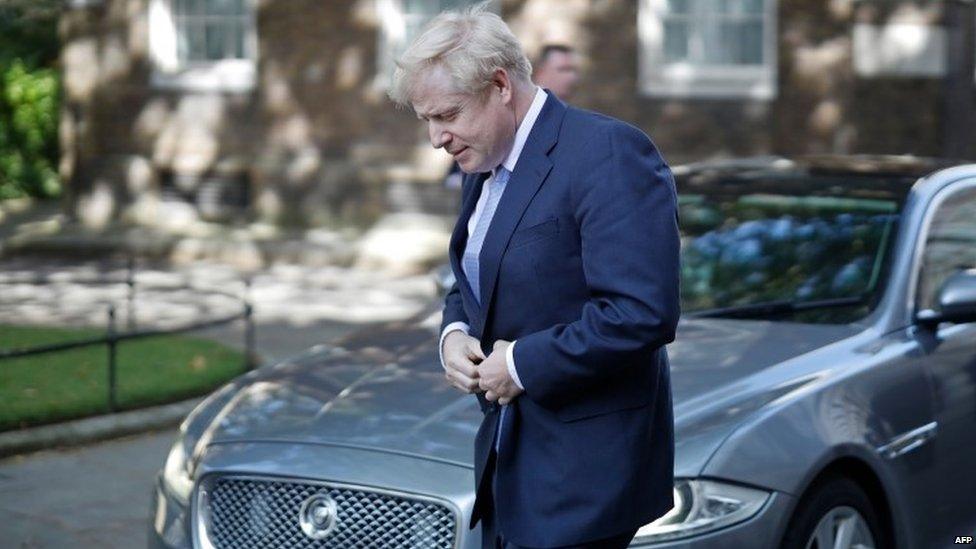
Only three days into his premiership and Boris Johnson has a lot to reflect on
He's reckless. He flies by the seat of his pants. He is a circus act.
That's the view not - or not only - of the Labour opposition, but of a Conservative who worked closely with Boris Johnson, former Foreign Office minister Sir Alan Duncan.
But the new prime minister is not reckless enough to discount an early election as a possibility. And he may, of course, comfort himself with the fact that circus acts can be quite popular.
Mr Johnson inherits, to all intents and purposes, no working majority at all.
With the help of the Democratic Unionists, he has a majority of two - and this will possibly halve by the end of next week if his party loses the Brecon and Radnorshire by-election.
He hasn't endeared himself to those ministers he massacred in this week's reshuffle/reboot and already has about 15 to 20 Remainers or anti-no dealers on his benches who may be prepared to rebel against him.
Sure, some Labour MPs such as Kate Hoey - who is standing down - or Sarah Champion might help him out on Brexit.
But should Labour table a motion of no confidence early in September - if the summer hasn't produced a deal with the EU - it could possibly win it, as even pro-Brexit Labour MPs will not want to tell their constituency parties they sustained Mr Johnson in power.
By then, also, a brace of Conservative MPs may have crossed the floor and be sitting alongside new Lib Dem leader Jo Swinson.
And some Conservatives - albeit a small number - who won't vote against their own government may just find they absolutely have to be somewhere else when the crucial moment is called.
So a contingency plan for an early election is sensible.
The question, though, is whether an early election isn't so much a contingency as plan A.
An election of choice
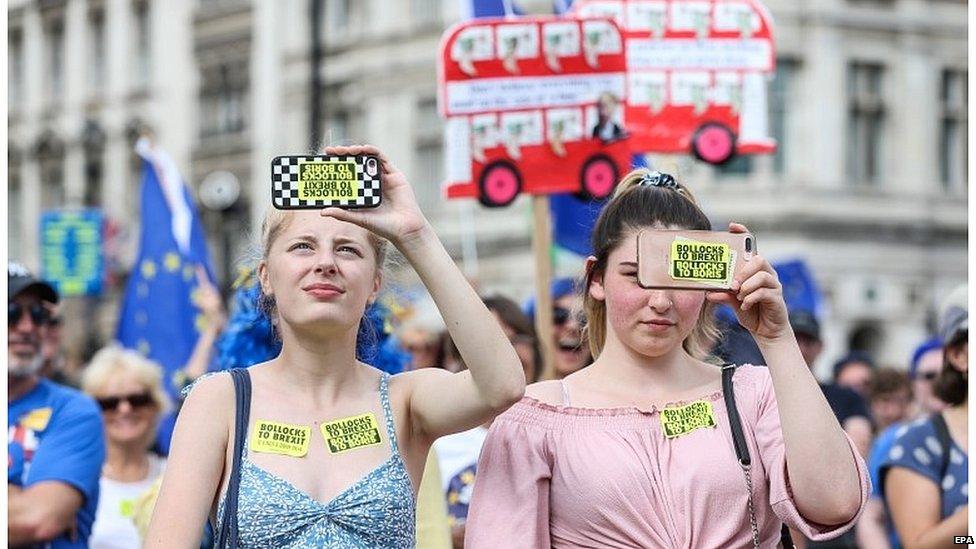
Will it take an election for Boris Johnson to prove the Brexit "gloomsters" wrong?
The official government line is that its full weight is being put behind the effort to deliver Brexit by 31 October.
And that, after a series of elections and referendums in recent years, the public would rather get Brexit done than see a return to the ballot box.
Indeed, Mr Johnson himself has suggested there will be no election until after Brexit is delivered.
I have spoken to a range of government and former government advisers, and what is striking is just how many think the election will nonetheless be somewhat sooner.
Of course, it's not certain but equally the evidence before our own eyes shouldn't be dismissed.
Here is the thinking:
The EU won't compromise on the backstop - or do a series of "mini-deals" on citizens' rights, mutual recognition of standards and so on.
Then the "doomsters and gloomsters" - as Mr Johnson likes to call them - in Parliament somehow block no deal or "mandate" him to go to Brussels to ask for a Brexit extension.
Mr Johnson has his casus belli. Defeatist Remainers at home, bossy bureaucrats in Brussels all trying to frustrate the will of the people and deny the result of the referendum.
Rather than being outmanoeuvred in a confidence vote, why not simply have the confidence to go on the front foot and call an election?
The subsequent manifesto pledges to give the EU a final chance to erase the backstop - which Brexiteers say is unacceptable, as it could tie the whole UK to EU rules ad infinitum - but is clear if it doesn't then the UK leaves with no deal.
Those who have argued that there is no mandate for it would be deprived of this attack if the Conservatives were to win the election.
The election would also conveniently be held before any effects of no deal are felt.
If it turns out that the pessimists are even half-right, well, the British people will, in effect, have voted to accept the risks of short-term disruption to be free of EU membership.
Opposition division
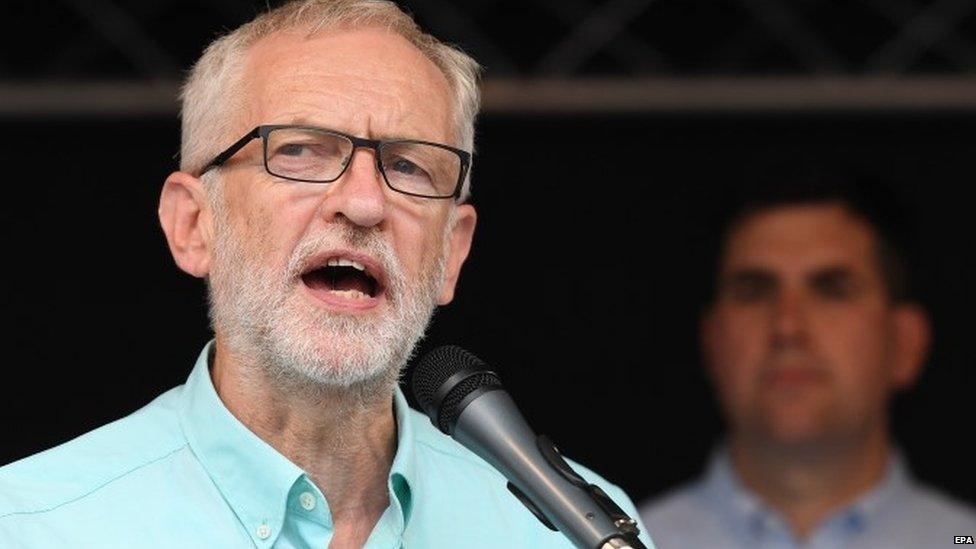
The Labour leadership wants an election too but can it count on winning over Remain voters
There is also another reason to go the polls early. If Boris Johnson pledges to come out "do or die" he may well hoover up significant Brexit Party votes.
Meanwhile, the Remainer vote would be split between the Lib Dems, the Greens and Labour.
The main opposition party will sound even more pro-Remain under these circumstances and will call for another referendum. But if still led by Jeremy Corbyn, some Remain voters will have their doubts about backing Labour, despite the argument being put that the party is best placed to stop a Boris Johnson hard Brexit.
Alastair Campbell was, remember, rather publicly expelled from Labour for admitting lending his vote to the Lib Dems in May's European elections.
But, privately, many card-carrying members of the Labour Party - including some former senior officials - have told me they did the same. For some "my party right or wrong" has been replaced by "Remain at all costs".
"There just isn't a better time for Boris to go to the country… an election on 17 or 24 October, while Corbyn is still there," said a well-placed and recent government adviser.
Even if there isn't a consistent, never mind whopping, Conservative opinion poll lead, "things will only get worse", they suggest.
But there are other reasons to go early.
In addition to the pro-Remain rebels sent to the backbenches, leading Brexiteer Steve Baker has refused a ministerial post in Mr Johnson's government.
So the new prime minister could face rebellions from him and other members of the highly Eurosceptic European Research Group even if he got the sort of bare-bones, backstop-less deal he wanted.
Surely he will not want to go down in history - and he does think in those terms - as a bombastic, bon mot-strewn version of Theresa May, suffering a series of defeats, each of which saps more of his authority.
A government or a campaign?
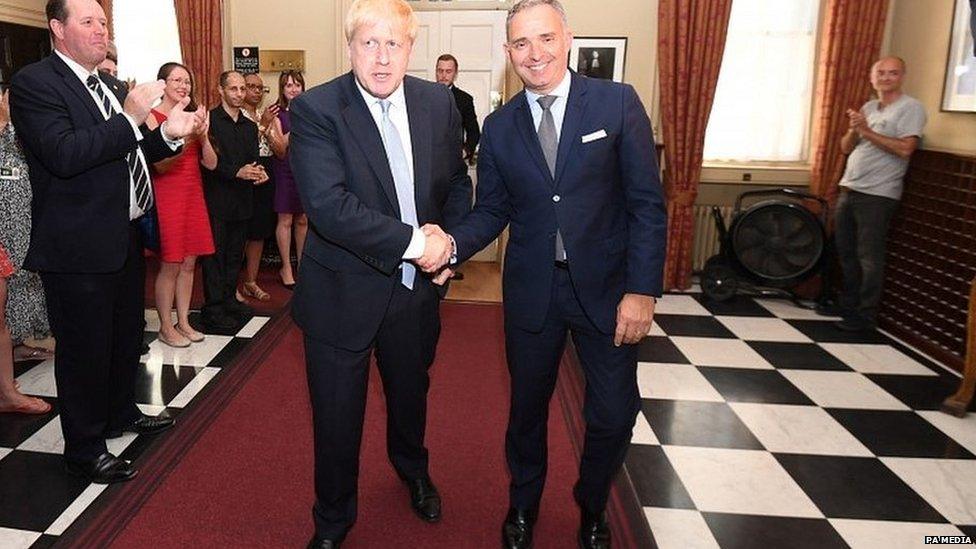
The presence of Dominic Cummings (back right) in No 10 has fuelled talk of a campaign mentality
Casual observers of politics could be forgiven for assuming we are already in an extended campaign.
Experienced ministers have been culled. Staunch Brexiteers - the backbone of the highly successful Vote Leave campaign - are in key positions.
Behind the scenes is the glowering yet inspiring figure of Dominic Cummings.
He helped shake up, sometimes by the throat, the education department alongside Michael Gove, but he is rather better known for being the driving force behind the messaging and targeting that got the Brexit vote over the line in 2016.
Although he has written what his critics would see as self-indulgent, self-justificatory pseudo-intellectual blogs and missives, at a private briefing by both the official remain and leave campaigns for broadcasters at the start of the 2016 campaign, he came across as the most clear-headed and focused participant.
His rather abrasive inter-personal skills, though, may suggest that his presence is more suited to a short-term and intense campaign than a long spell in government.
And if an early election proved inconclusive, Mr Cummings would be an asset in any further referendum campaign.... but we are now really getting ahead of ourselves.
Mr Johnson has also paid attention to his front-of-house team - what the cabinet looks like - with more MPs from ethnic minority backgrounds, more women and some good media performers.
Sophisticated, targeted Facebook ads are being trialled, and voters who are enthused by Mr Johnson's move to No 10 are being asked to share their priorities with him.
This summer, he will be doing what he does best - stomping round the country making a series of, in effect, stump speeches and taking part in the campaign activity at which he excels - the photo opportunity.
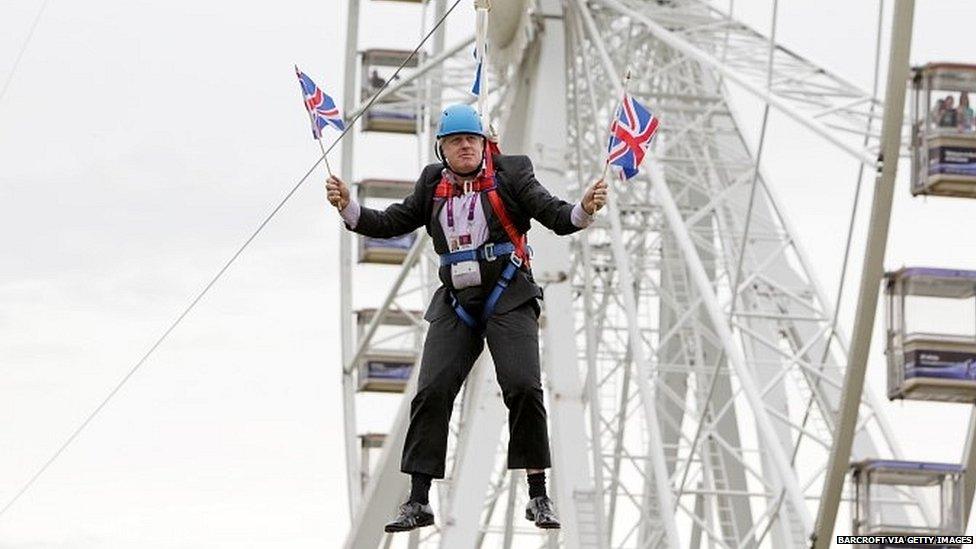
Research suggests Boris Johnson is not judged by the same rules as other politicians
Expect the equivalent of kipper-waving, zip-wire-hanging antics.
The self-styled political sophisticates groan but, let's face it, many rank and file Conservative members would have weighed up who might be the better leader for an imminent election campaign when choosing Mr Johnson over Jeremy Hunt.
Mr Johnson seems to have a preference for, as the phrase goes, campaigning in poetry.
The conservative pollster Lord Ashcroft reminded us on Friday of the detailed research he had done on the "Boris phenomenon" back in 2013.
This is what he found then:
A majority of voters thought of him as "different from most politicians, and in a good way"
He was famous for speaking his mind. "He says it how it is. In a very posh voice," as one focus group participant put it
Most were at a loss to say where he stood on any particular issue.
Despite the regular mishaps, outrages and minor scandals that seemed to punctuate his career, people often went out of their way to put a generous interpretation on them. I observed that "Boris is given the benefit of the doubt to an extent that other politicians can only dream of".
And the new prime minister already seems to be addressing the one weak point here - making it clearer where he stands.
Stand by me
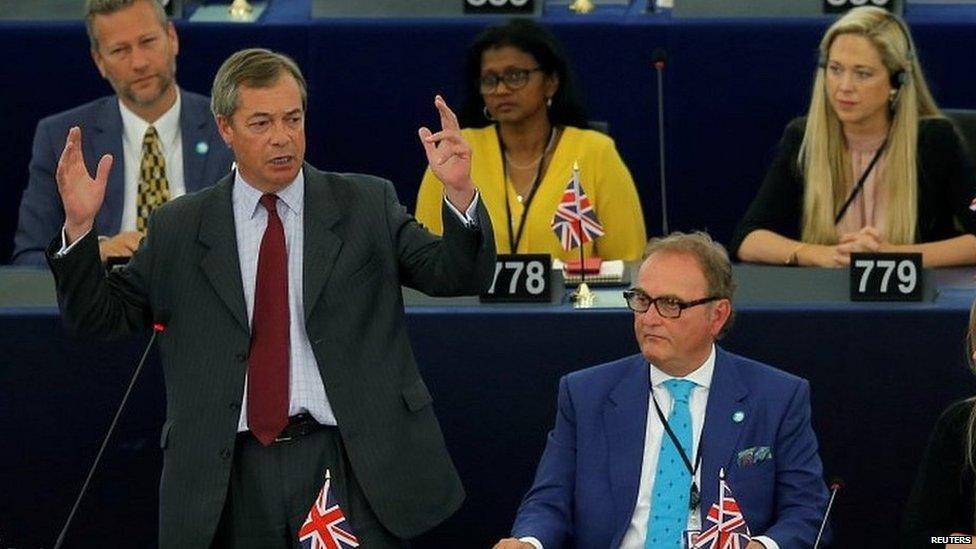
Would an early general election shoot Nigel Farage's fox?
He is repeating ad nauseam the 31 October EU leaving date, in an effort to see off Nigel Farage, but he is offering a series of symbolic policies that go beyond Brexit too.
Some - like the police "recruitment drive" - have hard numbers attached. So success or failure can be judged.
But if there is an early election he doesn't have to deliver the promised 20,000 police officers; he only has to make progress.
And his other priorities probably sound a lot like those which people are sharing with him on social media.
He is pledging to end the stasis in social care policy, but few would bet on a new system before the autumn. And he has promised a points-based immigration system but is starting the process with a review.
In short, he is setting out a direction of travel without having to reach his destination.
And there is always the possibility of an autumn giveaway Budget - one insider said: "There are no fiscal rules now. This is a new government."
Officially the government has "no plans" for such a Budget.
Yet Kit Malthouse - the new policing minister and former deputy to mayor Boris Johnson in London - suggested an emergency Budget would be announced to "stimulate the economy".
Former French President Charles De Gaulle - yes, someone who was happy to have Britain outside the European project - once said that "to govern is always to choose among disadvantages".
An early election is risky. But if Mr Johnson wants to govern, it may be more risky not to have one.